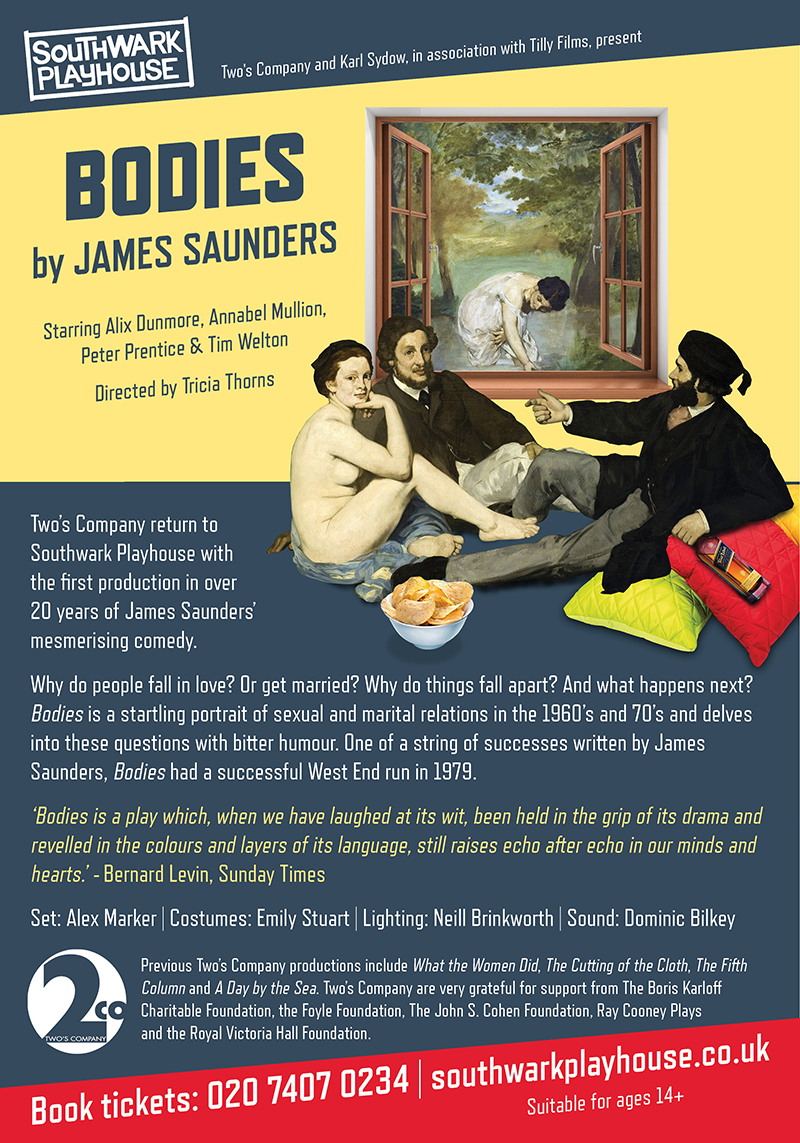Bodies
by James Saunders
Southwark Playhouse, February 2019
Director: Tricia Thorns
ABOUT THE PLAY
Why do people fall in love? or get married? Why do things fall apart? And what happens next? Bodies delves into these questions with bitter humour.
Mervyn and Anne used to spend a lot of time with David, Mervyn’s best friend, and Helen, David’s wife. The four were close. Anne starts an affair with David; Helen, in revenge, seduces Mervyn. This fragile situation cannot last, of course, and all the participants were scarred. We join them, nine years later …
James Saunders is a vivid explorer of 20th century living. Bodies takes place in the 1970s, but its themes are eternal and as fresh as paint.
James Saunders (1925-2004) achieved success in the 1960s with Next Time I’ll Sing to You and A Scent of Flowers. He wrote some 70 plays for theatre, TV and radio. He was an early exponent of the Theatre of the Absurd, and many of his plays expand the limits of traditional theatre. For 30 years he was associated with the Orange Tree Theatre, where Bodies was premiered. It was revived at Hampstead in a production which went to the West End. It had not been seen again until Two’s Company’s production.
PRESS
Dedicated to retrieving forgotten plays, Two’s Company bring us a rare sighting of James Saunders’ Bodies, first seen at the Orange Tree, Richmond in 1977 and later revived in the West End. While the play is about the spiritual crises of the time, it stands up well because it addresses serious questions about the creative value of suffering and makes you feel something vital is at stake.
The play starts as a study of two middle-class couples who each have affairs with the others’ partners. In that way it anticipates Harold Pinter’s Betrayal (1978), Peter Nichols’s Passion Play(1981) and Tom Stoppard’s The Real Thing (1982) in using adultery as a metaphor for wider anxieties. But Saunders gets to the heart of the matter in the second half, when the couples meet again after a nine-year-gap. Mervyn, an ebullient headmaster, has engineered the reunion to the dismay of his wife, Anne, so that he can question the new-found serenity of the guests, David and Helen, who have rebuilt their lives with the aid of a then fashionable therapy, EST (Erhard Seminars Training).
It would be an even better play if Saunders allowed the mercilessly articulate Mervyn to be rigorously challenged and if the two women played a more pivotal role. But Saunders still raises big issues and, while apparently endorsing Mervyn’s argument that art is “the most refined expression of neurosis”, also shows that it is possible to wallow in romantic agony. The play leaves you debating whether it is better to be happy and well adjusted, as David and Helen seemingly are, or racked with memories of the past like the intense Mervyn and Anne.
Tricia Thorns’s production moves smoothly from domestic comedy to intellectual debate and Tim Welton perfectly catches the dual aspects of Mervyn: he is both a passionate champion of the inseparability of poetry and pain and a bit of a boozy charlatan.
There is impeccable support from Annabel Mullion as his caustic wife, from Peter Prentice as the self-assured David and from Alix Dunmore, who subtly suggests that Helen is all too aware of the sense of loss that comes from curative therapy. –Michael Billington – The Guardian, 4 stars
This production directed by Tricia Thorns could not be bettered. The performances by the four strong cast are outstanding and the play remains a witty and devastating look at marriage, death and the meaning of life, and if that sounds that it is likely to be an evening of doom, gloom and despair think again. It is also very funny …. Tim Welton gives an amazing, exhausting and exhilarating performance – but for all the fireworks he generates he does not overwhelm the others… an evening to remember. – William Russell – Reviewsgate, 5 stars
James Saunders’s 1977 play is an arresting piece undeserving of the obscurity in which it has languished for most of the last forty years… The play is very good indeed at exploring group dynamics and Tricia Thorns’s direction carefully brings out every nuance. Mervyn gets steadily more drunk too which Welton handles with admirable skill and control. It’s a bravura performance… The other star of this show is Emily Stuart for her costumes. She perfectly captures that strange 1970s blend of elegance and excess. – Sardines, 4 stars
Several moments where audible gasps could be heard from the audience…The audience’s patience is rewarded with a fairly mesmerising showdown…this riveting and reflective production. – London Theatre 1, 4 stars
Director Tricia Thorns draws excellent performances from all her cast but the way Tim Welton presents Mervyn’s alcohol-fuelled desperation is acting to especially cherish. As well as a reality of increased inebriation, he gives us clear argument and consistent characterisation.
James Saunders writes beautifully, exploring matrimony, friendship and infidelity pursuing a debate that is still relevant and this cast deliver his text with impeccable clarity. Bodies is understanding about relationships and intellectually engaging but it is not heavy going for it is also often very funny. Howard Loxton – British Theatre Guide
Saunders said: “If there’s any theme that runs through my work, it’s the absurdity of finding logic in anything at all.” There is something devastating in Bodies, the title suggestive of massacre; death hovers overhead throughout, as it does in life, though we like to pretend it doesn’t.
There are plays that, when you see them onstage the first time, leave an imprint. The first time you hear Hedda Gabler fire that gun, for example. Bodies so engrossed me, I didn’t realise how engrossed I was until it was over. The enclosed space of The Little in Southwark Playhouse contributes to the feeling that the audience are also guests in the living-room. The confrontations all occur a little too close for comfort, and there is nowhere to hide once it all starts to go wrong. David’s excruciating calm is unavoidable. Helen’s resigned grace catches our eye. Anne’s regal malaise haunts the chaise longue, and we’re in direct line for Mervyn’s fire. All are right there, as though we’ve been brought to bear witness. The awesome foursome of the two couples had the tiny auditorium by the throat, with events culminating in what might just be one of the greatest unspoken lines I’ve heard, and a deeply moving finale. – Everything Theatre, 5 stars
It’s great to be able to say that this revival, by the enterprising Two’s Company, of his 1977 drama, which had a West End run in 1979, is both emotionally thrilling and intellectually satisfying…
Saunders constructs his play with great craftsmanship, and at its best his writing is both passionate and provocative…
As a cry from the heart, Bodies is thrillingly alive, both stimulating and moving.
And this is also due to Tricia Thorns’s scrupulous production, which takes place on Alex Marker’s open set, furnished in 1970s style, complete with Newton’s cradle and cream plastic phone. Her well-balanced cast are consistently good, with Annabel Mullion and Alix Dunmore providing depth and incisive presence to Anne and Helen, while Peter Prentice’s David becomes increasingly controlling as the evening passes. As Mullion strikes a note of exasperated sadness, Saunders’s view of human relationships finds a striking contrast: Tim Welton grows increasingly uninhibited and fiery as Mervyn drinks more and more whiskey, with his final speeches reaching the heights of feeling, proclaiming a disheveled manifesto for life beyond a perfectly well-balanced psyche (as eventually portrayed by David and Helen). It is great to see this modern classic revived with such energy and conviction. – Aleks Sierz
Welton does a great job of conveying Mervyn’s exasperation with the ennui of the former lovers. Under the aegis of alcohol, he picks away Helen and David’s ‘Stepford Wives’ demeanour – the ‘scab’ that hides the mess and pain beneath the surface. The suppressed, seething anger by Mullion’s Anne is a nice counterpoint to Mervyn in their role reversal.
It’s not easy to convey equanimity without it coming across as ‘fake’ or ‘unreal’, but the ‘stiillness’ of Prentice and Dunmore is perfectly executed. In the case of Prentice, his ‘micro’ facial expressions reveal the constant effort to remain on top of his emotions, while with Dunmore, her body language reveals early on how ‘unready’ Helen is to consciously bring the memories and emotions of yesteryear to the surface.
As the cornerstone of art and the mortar of relationships, the past pain we carry around shapes us – makes us who we really are. If we lose that, we lose ourselves. – Breaking the Fourth Wall – 5 stars






